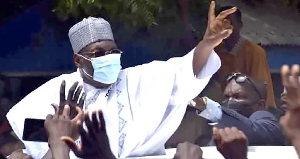The political class is silent. They haven't dared to comment on the attitude of the country on the issue of Boko Haram where as they should be suggesting to Cameroon key ideas to adopt in dealing with the Boko Haram.
In the context of this article, there is a question which seems to be embarrassing yet it is worth asking. Now, here is why we need to negotiate. It is necessary to negotiate to put an end to the war at the far North with regard to the trouble Nigeria and Chad faced in their negotiation with the Islamist sect Boko Haram.
In fact, Cameroon already negotiated with Aboubacar Shekawu, at least for the release of the hostages. The question here is whether a better structured framework for dialogue can open to identify the claims of Boko Haram and examine all the ways to find a response that will satisfy both parties.
The announcement by the Government and Nigerian army about signing of a ceasefire with Boko Haram, with the help of Chad, must move Cameroon to question the sincerity of these two countries, let alone form a coalition with them to "eradicate" (according to Paul Biya) this Islamist sect.
This agreement has to date, not been confirmed by Aboubacar Shekawu and the announcement to release schoolgirls of Chibok did not take place. 60 other Nigerian women were abducted and nothing has so far been heard.
All this agitation took place at the same time where the countries affected by Boko Haram were trying to agree on the best way to put their resources in common for a coordinated struggle. Taking account only of its national interests and its approach to domestic policy considerations, Nigeria, accompanied by Chad, has made a baby in the back of Cameroon.
As evidence, since this 'agreement', Boko Haram daily bombards Cameroon from Gambarou, Nigerian border town with an intensity incommensurate with his attacks from before, as could be seen during the visit of the Chief of staff of the armed forces, Rene Claude Meka, October 23.
His helicopter took off under intense fire rockets fired by Boko Haram, while he was visiting the first front line of Fotokol. The guerrillas have turned to permanent war. The loss of human life abounds as well as financial expenses and many people have been displaced.
Cameroon cannot afford such profligacy of energy and such bleeding on his way to economic growth today, and the emergence tomorrow. For a long time, Nigeria accused Cameroon of being the base of Boko Haram.
The Nigerian Government had even suffered estoppel in its application to exercise a right of prosecution of Islamists in Cameroonian territory.
Today, international law is put to the test, and nothing says that the two countries will permanently remain inactive before this particular case.
Indeed, the Cameroon-Nigeria border has been deserted by the Nigerian border authorities fleeing Boko Haram. Now they face Cameroon along the contact zone consisting of the cities of Cameroon as Fotokol, Amchidé, Limani, Koubougue, Ldama, Tourou, Achigachia, etc. Therefore, our army must be permanently be alert as the enemy sleeps in the next room and can act everywhere, at any time.
Following the announcement by the Nigerian authorities of a cease-fire, there was a redeployment of the elite troops of Boko Haram along the front with the Cameroon line. The fact remains that Boko Haram is not a State and therefore has neither territory nor border. They act on the sovereign territory of the federal State of Nigeria.
Each shell or rocket dropped from Nigeria to knock Cameroon can be regarded by them as a declaration of war. The Nigerian Government must answer for what takes place on its soil, but Boko Haram is a Nigerian phenomenon, and so Jonathan Goodluck is accountable. This bizzare shortcut covers a much more complex reality because, even the Nigerian armed forces have been overwhelmed by this sect, which has forced the soldiers to flee to Cameroon.
In any case, it is common ground that, regardless of the attacks, Cameroon will not send his army to fight Boko Haram on Nigerian land. Boko Haram is like this unruly kid who gives you a kick and get away between the legs of his father. If the parent is also lax as Nigeria is with the Islamist sect, he must give the contested people a good spanking. This will settle the business of everyone.
Pending resolutions of the Summit of Heads of State and Government of the countries of the Lake Chad basin, which envisaged the creation of a joint multinational force as early as November 20, the reality of the field takes precedence. There is a level of mistrust also among stakeholders with regard to the recent actions of Nigeria and Chad. Yet, none of the three can only come to terms with Boko Haram militarily.
The Nigerian Army has shown, despite more than a million of men, incapable of curbing this adversity. Chad is a little less concerned. But the head of State in Cameroon, said he would fight Boko Haram until its eradication.
The reality is that, the Boko Haram situation is much more complicated than he knows. So at this point what he needs to do is that, he must negotiate peace at our border by announcing a cease-fire with Boko Haram.
Nigeria wants to guide the sect to the Cameroonian exclusive front by opening talks with Aboubacar Shekawu. The Government of Cameroon has to carry out a non-aggression pact of exportation of Islamist violence from his country, an attitude that is not adherence to the methods of this country, but it must be done for the safety of his poeple as this is one of the most dangerous threats in our century.
"We did not negotiate with terrorists", is a seductive expression for the pride of a country, but everyone knows that negotiations begin as soon as the microphones are closed.
Opinions of Monday, 3 November 2014
Auteur: Perfect N. Siki














